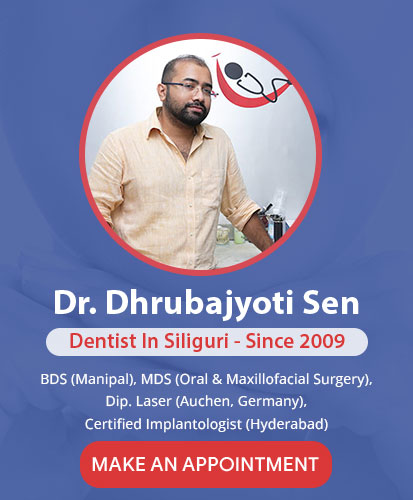Do you have second thoughts and doubts about dentistry and treatment techniques for a happy oral health? We have answered the most frequently asked questions about dental health. Feel free to get in touch with us for more.
The probable reason would be an impacted third molar commonly called wisdom tooth. In some instances it might require a surgical extraction.
Absolutely, Dr. Dhrubajyoti Sen is a pioneer in Implants and is a mentor for students. He has placed over 5000 implants and many full mouth replacements. For many such cases have a look at the patient gallery.
Absolutely, through the combination of Orthognathic Surgery and Orthodontics one can get a symmetric and desirable facial profile in most cases. Refer to patient gallery.
Through Arthrocentesis, lasers and physiotherapy many TMJ ailments can be taken care of.
Most cases can be cured through restorations or root Canal treatments. Dr Sen specializes in single sitting Root Canal treatments and you can get immediate relief from the pain.
Through Immediate implabtation procedures, damaged teeth can be extracted and Implants placed in the same appointment thereby giving you fixed teeth in the same appointment. The patient can happily go smiling after the appointment.
RCT is an extremely sensitive procedure which requires high end instruments and X-rays. At Doctor Smile we involve the most advanced methodologies for treatment.
Through Re-RCT procedures most teeth can be saved for around 10 years or more.
Doctor Sen is a pioneer in All on 4, All on 6 and full mouth implpantology. Most patients can be treated with implants and can be given fixed teeth thereby helping them chew all food and giving them a beautiful set of teeth to smile.
God has given us 32 teeth. Certain teeth might face problems which may go undetected. We recommed a dentist visit atleast once a year to have a healthy set of teeth and gums.
A root canal treatment is highly effective and involves minimal pain. The doctor also uses general anaesthesia during the surgery to reduce discomfort. You must speak to the dentist immediately if you experience severe pain.
It is common to experience mild discomfort after getting the braces but it will never hurt you. Some patients may suffer from a jaw ache or soreness that can be relieved with over-the-counter pain relievers.
Poor dental hygiene can lead to the development of various dental issues. Some such issues include gum disease, tooth cavities, cracked teeth, tooth sensitivity, and tooth erosion.
Cleaning your teeth regularly, brushing your teeth twice daily, eating a balanced diet, and scheduling routine dental check-ups are some of the ways to improve your dental health.
Dental cleaning from a professional dentist is essential for overall dental well-being. This helps in removing all the accumulation and plaque from your teeth which are associated with the majority of dental problems.
To maintain dental health, it is advised to schedule dental check-ups twice a year. The examination frequency may increase if you suffer from any gum diseases or cavities.

